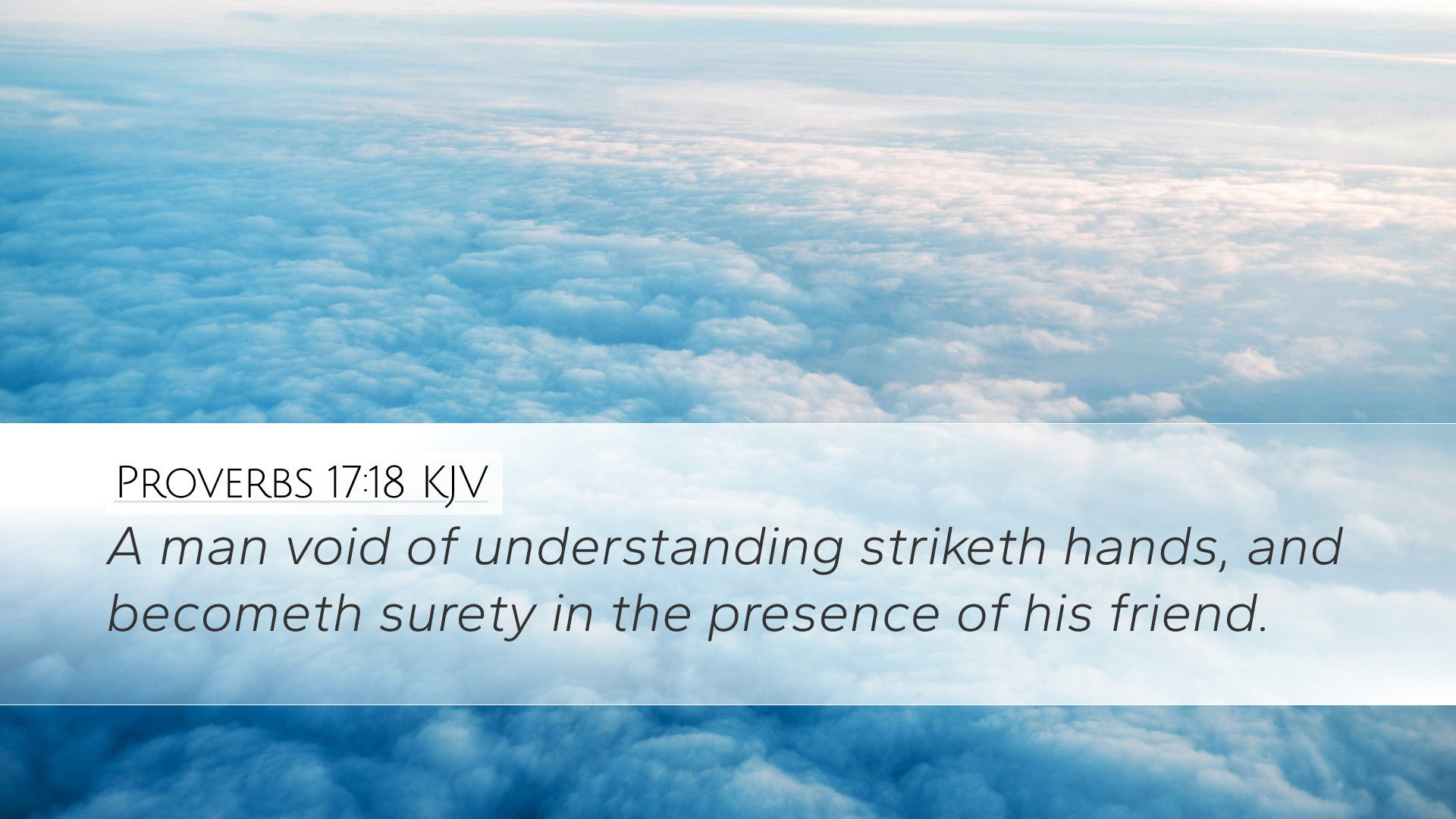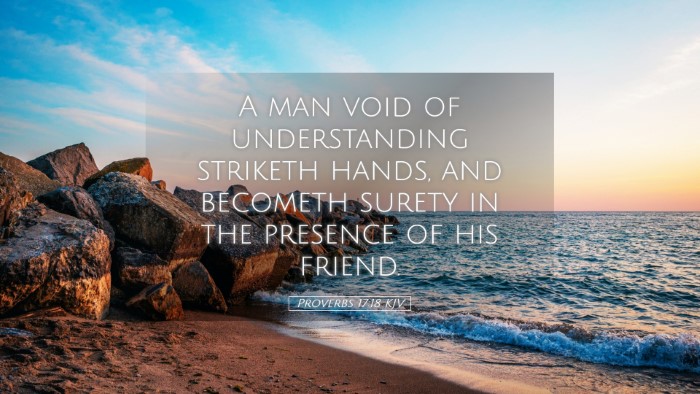Commentary on Proverbs 17:18
Proverbs 17:18 (KJV): "A man void of understanding striketh hands, and becometh surety in the presence of his friend."
Introduction
The Book of Proverbs, attributed predominantly to King Solomon, is a rich source of wisdom literature. Proverbs 17:18 presents a profound insight regarding interpersonal relationships and the nature of commitments. This commentary seeks to explore the verse's implications for understanding wisdom, accountability, and the repercussions of agreements made impulsively.
Contextual Background
Proverbs are teachings that encapsulate daily living principles. This verse is set within a broader discourse on the value of wisdom versus the folly of rash behaviors. As we investigate this verse, a focus on the culturally relevant understanding of friendship, fidelity, and financial interactions during the proverbs' time will shed light on its full meaning.
Verse Analysis
Literal Interpretation
The phrase "A man void of understanding" refers to an individual lacking wisdom or discernment. The term "void" suggests a significant deficiency in understanding, indicating not just ignorance but a deliberate absence of wisdom. The second part, "striketh hands", denotes entering into an agreement or bond, commonly involving financial surety or providing collateral on behalf of another.
Understanding "Surety"
In a biblical context, to become surety means to pledge oneself as a guarantor for someone else's obligations. Adam Clarke notes that this act, particularly without adequate judgment, can lead to financial ruin, making this verse a cautionary statement against imprudent commitments.
Thematic Insights
The Importance of Wisdom
Throughout Proverbs, the theme of wisdom is paramount. This verse underscores the necessity of discernment in all interactions, especially concerning friendships and financial dealings. Albert Barnes emphasizes that true friendship involves not just emotional or social loyalty but also prudence in how one engages with the financial responsibilities that friendships might invoke.
Friendship and Accountability
Striking hands symbolizes a bond that is often seen as sacred, particularly within the context of friendship. Hence, the verse warns against making commitments lightly. Matthew Henry comments that genuine friends should be those who encourage each other's wisdom and caution, rather than leading one another into foolishness.
Warnings Against Rash Decisions
The admonition against becoming surety highlights a key principle in financial dealings: the need for careful consideration before taking on another's liabilities. The "man void of understanding" acts impulsively, ignoring the potential repercussions on his own future. This theme of thoughtlessness serves as a broader warning against any hasty decisions that can stem from emotional impulse, especially in close relationships.
Practical Applications
- Fostering Wise Relationships: Pastors and leaders are encouraged to cultivate environments that promote wisdom among congregants. Teaching sessions can expand on the importance of discernment in relationships, cautioning against hasty commitments.
- Pre-marital and Financial Counseling: This verse can provide a foundational principle in counseling contexts, illustrating the necessity of discussion and understanding before committing in significant life areas such as marriage or business.
- Community Responsibility: Church communities can develop systemic approaches to ensure mutual accountability, emphasizing wise stewardship of finances among members.
Theological Reflections
This passage invites reflection on the fundamental nature of wisdom and its theological implications. God, as the ultimate source of wisdom, contrasts human folly. Engaging with Proverbs 17:18 can serve as a reminder of the need for divine wisdom in all areas of life.
Reflection on Commitment to Christ
In a New Testament perspective, the act of surety can be seen in light of Christ's commitment to humanity. Unlike the "man void of understanding," Jesus fully comprehended the weight of His sacrificial commitment, offering Himself as the ultimate surety for all sin. Thus, believers can find assurance in His wisdom and steadfastness, encouraging them to avoid needless risk in their own commitments.
Conclusion
Proverbs 17:18 provides a timeless caution against the pitfalls of emotional impulsivity and lack of discernment in friendships, particularly in financial matters. By fostering a commitment to wisdom, understanding, and responsible relationships, we can navigate our lives in a manner that reflects the heart of God. In teaching and application, this verse remains relevant across generations, calling individuals to reflect deeply on their choices and their understanding of true friendship.


